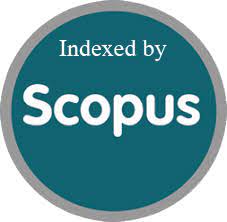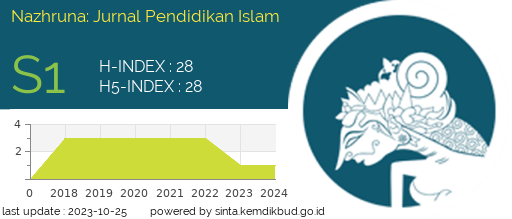The Importance of Islamic Education for The Mental Health of Youth in Using Social Media
Abstract
The purpose of this study was to analyze how the behaviour of adolescents uses social media and to analyze whether there is a relationship between Islamic education and the mental health of adolescents in utilizing social media in Binjai Bakung Village, Deli Serdang Regency. This study uses a quantitative method with a research design cross-sectional. For the sampling technique use the technique of purposive sampling. The population in this study were all young men and women who attended the National Development Education Foundation (PEMNAS) Binjai Bakung, Pantai Labu District, Deli Serdang Regency; in the 2022/2023 school year. While the sample is taken from a population of as many as 240 people. The inclusion criteria in this study were junior high school, high school and vocational school youth who attended the PEMNAS, were willing to be respondents and were on the spot. The collected data was analyzed using SPSS (Statistical Program for Social Science) by testing the level of validity and reliability as well as conducting univariate tests and chi-square tests. Based on the results of statistical testing chi-square with-values0.248> 0.05. This means there is no relationship between social media use and adolescent mental health. This is because most teenagers prefer to access Islamic content as many as 84 people (35%) from 240 people, while teenagers who are interested in accessing entertainment content as many as 33 people (13.8%) from 240 people.
Downloads
References
Afriantoni. Prinsip-Prinsip Pendidikan Akhlak Generasi Muda: Percikan Pemikiran Ulama Sufi Turki Bediuzzaman Said Nursi. Yogyakarta: Budi Utama, 2015.
Alfitri, Rosyidah, and Raden Maria veronika Widiatrilupi. ‘Dampak Penggunaan Internet Terhadap Perkembangan Fisik Remaja Pada Masa Pandemi Covid-19 Di Kota Malang’. Jurnal Formil (Forum Ilmiah) Kesmas Respati 5, no. 2 (2020): 173. https://doi.org/10.35842/formil.v5i2.329.
Alkouatli, Claire. ‘Pedagogies in Becoming Muslim: Contemporary Insights from Islamic Traditions on Teaching, Learning, and Developing’. Religions 9, no. 11 (November 2018): 1–18. https://doi.org/10.3390/rel9110367.
Bukian, Putu Agus Windu Yasa, and I. Wayan Sujana. ‘Yoga Asanas as an Effort to Reduce Anxiety on Online Learning During Pandemic in Stikes Buleleng Students’. Al-Mada: Jurnal Agama, Sosial, Dan Budaya 5, no. 1 (31 January 2022): 56–62. https://doi.org/10.31538/almada.v5i1.1870.
Burhanuddin, Yusak. Kesehatan Mental. Bandung: Pustaka Setia, 1999.
Dhende, Tejashree Ramesh. ‘The Impact of Using Gadgets on Children’s Psychology’. International Journal of Applied Research 5, no. 8 (2019): 157–60.
Fernández-Batanero, José-María, Pedro Román-Graván, Miguel-María Reyes-Rebollo, and Marta Montenegro-Rueda. ‘Impact of Educational Technology on Teacher Stress and Anxiety: A Literature Review’. International Journal of Environmental Research and Public Health 18, no. 2 (January 2021): 548. https://doi.org/10.3390/ijerph18020548.
Hamzah, Siti Raba’ah, Azimi Hamzah, Jamilah Othman, and Sharmila Devi. ‘Impact of Islamic Values on the Leadership Style of Muslim Women Academics in Malaysia’. Advances in Developing Human Resources 18, no. 2 (1 May 2016): 187–203. https://doi.org/10.1177/1523422316641402.
Haq, Endun Abdul, Iim Wasliman, R. Supyan Sauri, Faiz Karim Fatkhullah, and Ahmad Khori. ‘Management of Character Education Based on Local Wisdom’. Nidhomul Haq : Jurnal Manajemen Pendidikan Islam 7, no. 1 (24 March 2022): 73–91. https://doi.org/10.31538/ndh.v7i1.1998.
Hawari, Danang. Al-Qur’an, Ilmu Kedokteran Jiwa Dan Kesehatan Jiwa. Yogyakarta: Dana Bhakti Prima Yasa, 1997.
Hendrawati, Sri, and Aat Sriati. ‘Tingkat Kecanduan Media Sosial Pada Remaja’. Journal of Nursing Care 3, no. 1 (2020): 41–53.
Hepburn, Stevie-Jae, Annemaree Carroll, and Louise McCuaig. ‘Exploring a Complementary Stress Management and Wellbeing Intervention Model for Teachers: Participant Experience’. International Journal of Environmental Research and Public Health 18, no. 17 (January 2021): 9009. https://doi.org/10.3390/ijerph18179009.
Hidayah, Siti Na’ilul, and Ashif Az-zafi. ‘The Role Of The Religious Laboratory In Improving Students ’Understanding Of Fiqh Lessons’. Tafkir: Interdisciplinary Journal of Islamic Education 2, no. 2 (25 July 2021): 157–74. https://doi.org/10.31538/tijie.v2i2.53.
Illah, Attok, Rosichin Mansur, Muhammad Fahmi Hidayatullah, Sariman Sariman, and Isamaae Seena. ‘Principal Leadership in Developing the Competence of Islamic Religious Education Teachers’. Nidhomul Haq : Jurnal Manajemen Pendidikan Islam 7, no. 3 (8 November 2022): 404–19. https://doi.org/10.31538/ndh.v7i3.2658.
Intan, Ghita. ‘Kemenkes: Gangguan Jiwa Meningkat Akibat Pandemi’. voaindonesia, 2021. https://www.voaindonesia.com/a/kemenkes-gangguan-jiwa-meningkat-akibat-pandemi/6259880.html.
Jankowski, Tomasz, Wacław Bąk, and Łukasz Miciuk. ‘Adaptive Self-Concept as a Predictor of Dispositional Mindfulness’. Personality and Individual Differences 190 (1 May 2022): 111519. https://doi.org/10.1016/j.paid.2022.111519.
Ji, P., & Skoric, M. M. ‘Gender and Social Resources : Digital Divides of Social Network Sites and Mobile Phone Use in Singapore’. Chinese Journal of Communication 6, no. 2 (2013): 221–39.
John, Maggie R. Guinta and Rita M. ‘Social Media and Adolescent Health’. PEDIATRIC NURSING 44, no. 4 (2018): 1.
Kadafi, Asroful, Alfaiz Alfaiz, M. Ramli, Dahlia Novarianing Asri, and Juwita Finayanti. ‘The Impact of Islamic Counseling Intervention towards Students’ Mindfulness and Anxiety during the COVID-19 Pandemic’. Islamic Guidance and Counseling Journal 4, no. 1 (31 January 2021): 55–66. https://doi.org/10.25217/igcj.v4i1.1018.
Kaspani, Anan. ‘Pengaruh Media Sosial WhatsApp Sebagai Media Silaturahim Mahasiswa Komunikasi Penyiaran Islam IAIN Syekh Nurjati Cirebon Angkatan Tahun 2015’. Skripsi Cirebon, no. Program Sarjana IAIN Syekh Nurjati Cirebon (2019): 19.
Koenig, Harold G., and David B. Larson. ‘Religion and Mental Health: Evidence for an Association’. International Review of Psychiatry 13 (2001): 67–78. https://doi.org/10.1080/09540260124661.
Limilia, Putri, and Puji Prihandini. ‘Perbedaan Motif Penggunaan Internet Antar Gender Sebagai Bentuk Baru Kesenjangan Digital’. Medium 6, no. 2 (2018): 1–14. https://doi.org/10.25299/medium.2018.vol6(2).2003.
Notosoedirdjo, Moeljono, and Latipun. Kesehatan Mental: Konsep Dan Penerapan. Malang: UMM Press, 2014.
Prasetyo, Muhammad Anggung Manumanoso. ‘Pesantren Efektif: Studi Gaya Kepemimpinan Partisipatif’. Munaddhomah: Jurnal Manajemen Pendidikan Islam 3, no. 1 (10 June 2022): 1–12. https://doi.org/10.31538/munaddhomah.v3i1.159.
Pratama, Anom dan. ‘Hubungan Intensitas Penggunaan Media Sosial Dengan Kecenderungan Sikap Apatis Terhadap Lingkungan Sekitar Pada Siswa SMP N 1 Sukoharjo, Kec/Kab …’. IJMS-Indonesian Journal on Medical Science 6, no. 1 (2019): 51–56.
Pratama, Bangkit Ary. ‘Efek Penggunaan Jejaring Sosial Terhadap Perilaku Seksual Pranikah Pada Remaja Di SMP Negeri 1 Sukoharjo’. Indonesian Journal on Medical Science 2, no. 2 (2015): 56–64.
Rahman, Rini, Dinovia Fannil Kher, and Yati Aisya Rani. ‘ISLAM TRANSFORMATIF: Journal of Islamic Studies Vol. 01 , No. 02., Juli-Desember 2017 Rini, Dinovia, Yati 94’ 01, no. 02 (2017): 94–104.
Reza, Iredho Fani. ‘Efektivitas Pelaksanaan Ibadah Dalam Upaya Mencapai Kesehatan Mental’. Psikis : Jurnal Psikologi Islami 1, no. 1 (2015): 105–15.
Riyanto, Andi Dwi. ‘Hootsuite (We Are Social): Indonesian Digital Report 2022’. Digital Data Indonesia 2022 Data Reportal. Kepios. We Are Social., 2022. https://andi.link/hootsuite-we-are-social-indonesian-digital-report-2022/.
Rizkinaswara, Leski. ‘Penggunaan Internet Di Indonesia’. Kementerian Komunikasi dan Informatika RI, Direktorat Jenderal Aplikasi Informatika, 2019. https://aptika.kominfo.go.id/2019/08/penggunaan-internet-di-indonesia/.
Romadhoni, Lailiyatur, Diloda Shokhibul Anam, and Maya Lestari. ‘Smart Uses Da’wah Social Media: Konsep Revolusi Kesehatan Mental Remaja Melalui Strengthening Morals of Islam’. Psisula: Prosiding Berkala … 2, no. November (2020): 401–12.
Rosyad, Rifqi. ‘Pengaruh Agama Terhadap Kesehatan Mental’. Syifa Al-Qulub, 2016.
S, Muh Tang, Zulkifli Zulkifli, B. M. A. S. Anaconda Bangkara, Maryam Maryam, and Dina Hajja Ristianti. ‘Exploration of Technology Transformation-Based Learning Experiences and Higher Education Leadership’. Tafkir: Interdisciplinary Journal of Islamic Education 3, no. 2 (2022): 181–97. https://doi.org/10.31538/tijie.v3i2.249.
Santrock, John W. Adolescence: An Introduction, 3rd Ed. Adolescence: An Introduction, 3rd Ed. Dubuque, IA, US: Wm C Brown Publishers, 1987.
———. Educational Psychology. McGraw-Hill Education, 2017. https://lib.hpu.edu.vn/handle/123456789/32485.
Sarfraz, Muddassar, Wang Qun, Li Hui, and Muhammad Ibrahim Abdullah. ‘Environmental Risk Management Strategies and the Moderating Role of Corporate Social Responsibility in Project Financing Decisions’. Sustainability 10, no. 8 (August 2018): 2771. https://doi.org/10.3390/su10082771.
Septiana, Nila Zaimatus. ‘Dampak Penggunaan Media Sosial Terhadap Kesehatan Mental Dan Kesejahteraan Sosial Remaja Dimasa Pandemi Covid-19’. Jurnal Nusantara of ResearcH 8, no. 1 (2021): 1–13. https://doi.org/10.29407/nor.v8i1.15632.
Sholeh, Sholeh. ‘Konsep Pendidikan Islam Yang Ideal: Upaya Pembentukan Keperibadian Muslim’. Al-Hikmah: Jurnal Agama Dan Ilmu Pengetahuan 13, no. 1 (2016): 52–70. https://doi.org/10.25299/al-hikmah:jaip.2016.vol13(1).1511.
Solahudin, Dindin, and Moch Fakhruroji. ‘Internet and Islamic Learning Practices in Indonesia: Social Media, Religious Populism, and Religious Authority’. Religions 11, no. 1 (January 2020): 19. https://doi.org/10.3390/rel11010019.
Sundus. ‘The Impact of Using Gadgets on Children’. Journal of Depression and Anxiety 7, no. 1 (2018): 1–3.
Susanti, Septiani Selly. ‘KESEHATAN MENTAL REMAJA DALAM PERSPEKTIF PENDIDIKAN ISLAM’, 2019, 1–20.
Taqwa, Mayvita Innani. ‘Intensitas Penggunaan Media Sosial Instragram Stories Dengan Kesehatan Mental’. Skripsi. Malang: Universitas Muhammadiyah Malang, 2018.
Yusuf, Muhammad, Ayu Lika Rahmadani, Yuni Lestari, and Dwi Setia Kurniawan. ‘Urgensi Pendidikan Islam Dalam Menjaga Kesehatan Mental Remaja Di Lingkungan Sekolah Pada Era Media Sosial’ 5, no. 01 (2022): 1–17. https://doi.org/10.37542/iq.v5i01.338.
Copyright (c) 2023 Raihan Melisa Lubis, Ira Suryani, Adam Syahputra, Wina Sahila

This work is licensed under a Creative Commons Attribution-ShareAlike 4.0 International License.










1.jpg)


